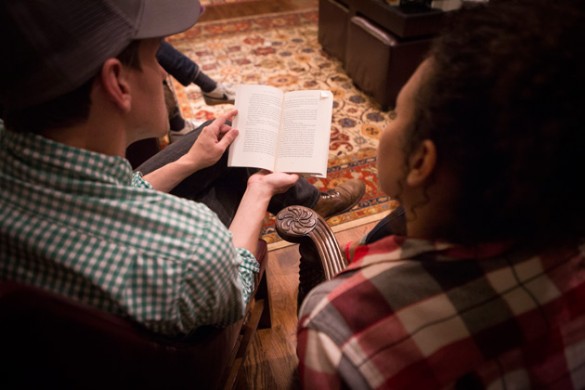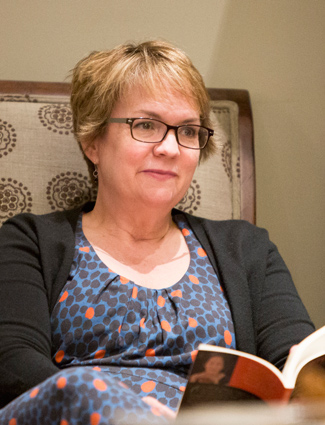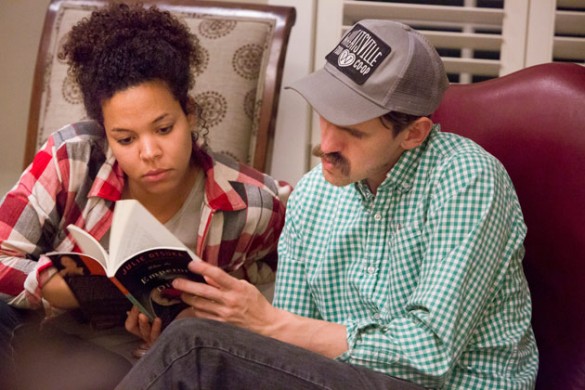
On the list of things undergraduates at Vanderbilt University don’t need, one more book to read by a deadline might rank pretty high.
But when first-year student Katie Gillet saw the big white banner hanging in the lobby of the student center at The Martha Rivers Ingram Commons advertising the Dean’s Book Club, she decided to give it a try.
“It happens in the dean’s living room in a very informal setting, which has been nice for me because it makes the book feel less like homework,” said Gillet, a chemistry and theater major from Colorado. “For me, and I’m sure for a lot of busy Vanderbilt students, it’s been a long time since we’ve been able to just read for pleasure.”
The Dean’s Book Club is one facet of the Writers-in-Residence program, which mixes students from Vanderbilt’s highly regarded MFA creative writing program with students from the university’s first-year living and learning community to talk about fiction and poetry.
The program is the brainchild of Kate Daniels, director of creative writing and professor of English.
“I think it’s pretty fair to say that the introduction to the Vanderbilt undergraduate social world can be pretty daunting for a lot of students,” Daniels said. “I’m sure many of them roll with it and it’s OK.
“But what about the gnarly, introverted kids who like to read books and love to talk about whether the comma should go here or here?” she said, poking a finger at a paper on her desk.
“It has always been my sense that that particular kind of student may have some trouble getting purchase that first year,” she said. “So I thought, why don’t we identify this space for those kinds of students—highly creative, introverted, lone-wolf types—to find others like themselves so they can be creative together?”
Dean’s Book Club

The Dean’s Book Club meets once a month at the campus home of Vanessa Beasley, dean of The Ingram Commons and associate professor of communication studies. The graduate student writer-in-residence who selected that month’s book gives a short presentation, and then the discussion begins.
“We sit around and eat cookies and chat about the book,” Gillet said. “They select short, interesting books, so it takes just enough time per month that it’s something I enjoy, and it doesn’t end up feeling like a burden.”
The Dean’s Book Club alternately considers fiction and poetry. Books read during 2015-16 included The Curious Incident of the Dog in the Night-Time by Mark Haddon, Tenth of December by George Saunders and poetry by Suji Kwock Kim, Eduardo C. Corral and Tony Hoagland.
Writers-in-residence
Each writer-in-residence is assigned to one or two houses at The Ingram Commons, and they all engage the students in their houses with additional programming.
“I send my houses the Weekly Fiction Fix, a story excerpt linked to a full story,” said Kelsey Norris, the writer-in-residence for North and Sutherland houses. “When a visiting writer is coming, I send out an excerpt from one of their stories in that Fiction Fix along with the details for the reading that week. I’ve also gone to a couple events at each house to do some sort of creative programming.”
Writer-in-residence Tiana Clark, who works with East and Memorial houses, often encourages students to take up writing themselves. Many of them have already tried it at some point in their lives, she said.
Clark thinks creative writing can work as a balm for the overtaxed first-year students.
“Doing creative writing exercises helps students start to talk about themselves, and it starts to engage them in all their five senses,” she said. “I tell them to start keeping a journal. College is a very crazy and interesting time of life. I want creative writing to be for them—because it is for me—a cathartic release.”
Clark also has taken her students to less structured outings, such as poetry readings, as well as attended open mic nights and talent contests produced by the students.
Building networks
Beasley sees the Dean’s Book Club meetings as an opportunity for her to really get to know more students.
“The challenge of my job is space and time,” she said. “I’ve met every Commons student, but we continue to need opportunities to really talk.”
All meaningful interactions that students have with fellow students, faculty and staff are valuable, Beasley said.
“They are learning how to build their social network—their professional network, their intellectual network,” she said. “Also, I hope we are teaching them that it’s OK for them to show up to something and start to ask questions. We all can’t know everything.”
Vanderbilt recruits high achievers, Beasley noted. There is a lot of stress involved in maintaining those standards when they find themselves grouped here with other high achievers.

“Book club gives us an opportunity to talk about things—what we liked or didn’t like about the characters, what we noticed in the language choice, why we think the metaphors work well or not—without any one of us being the official expert,” she said. “And it is OK if we have different opinions.
“We’re not going to be our best selves every single day and every single moment,” Beasley said. “That’s part of what we’re doing over here (at The Ingram Commons). We are living and learning together, and along the way we’re going to stumble into areas we don’t know much about. At book club, that might be a new poem or a novel that takes place in another country. We’re also going to admit to each other that we don’t know as much as we thought we did.
“I think that’s the beauty of it,” she said.
Out of the shell
Clark found it inspiring when she was able to make a connection with a student who came to his first Writers-in-Residence event “for the free pizza.” The student was a stressed-out double major, neither of them related to English.
“I took him out to coffee, and we got to talking and now we email each other,” Clark said. “He had dad issues and I had dad issues. So I showed him all my ‘daddy-issues’ poems, and he was able to write a poem about things he wasn’t able to talk about with his father for a long time. That was a really cool spark between us.”
An equivalent experience may await other Ingram Commons students who participate in the Writers-in-Residence program, Clark said.
“I turn to writing to help make meaning of the world and to help understand myself in relation to the world,” Clark said. “That’s what I think the power of creative writing can do. So it’s nice for me to kind of be a tour guide.
“It’s fun pulling them out of their shell,” she said.
Writer Jim Patterson is a 2015 graduate of Vanderbilt’s Master of Liberal Arts and Science program.